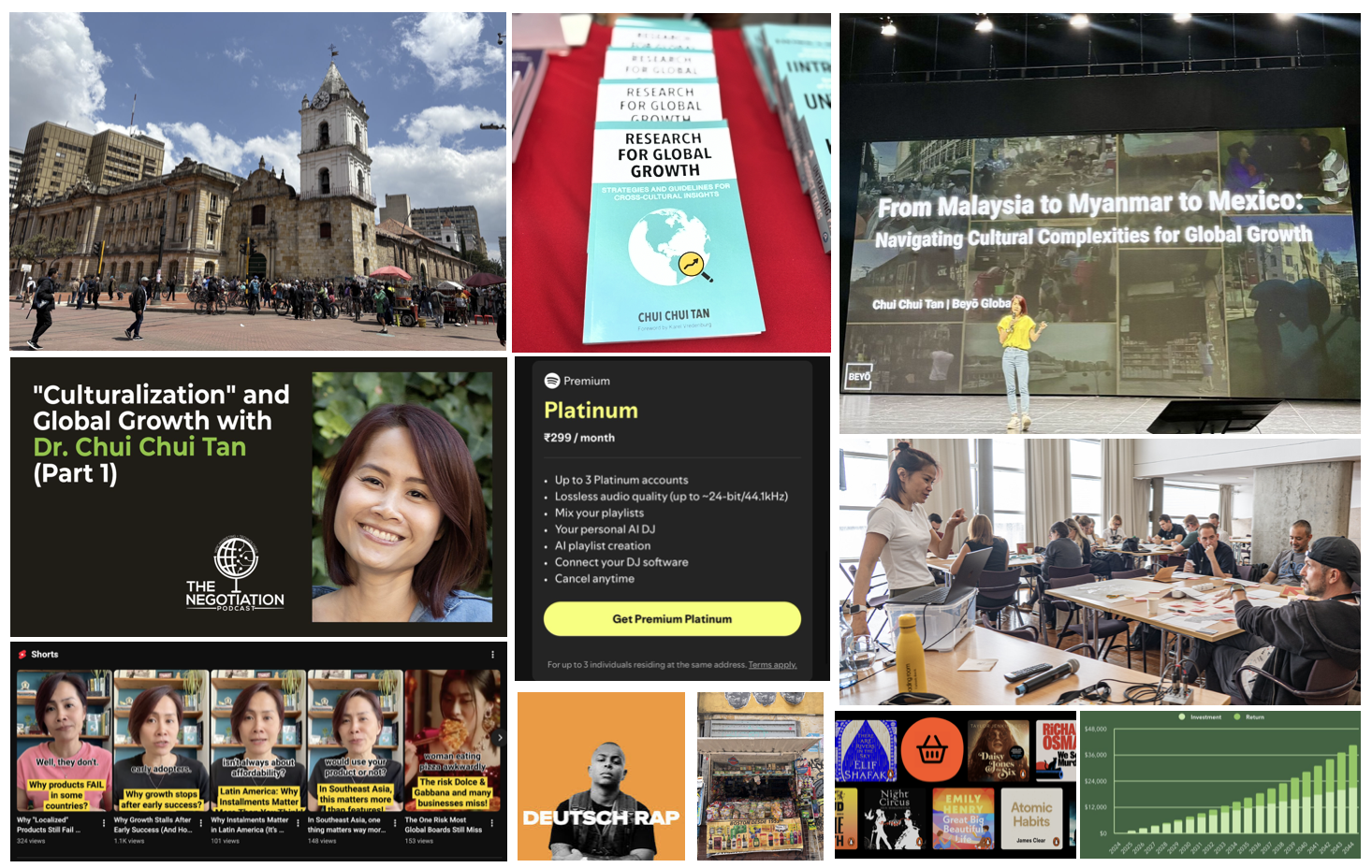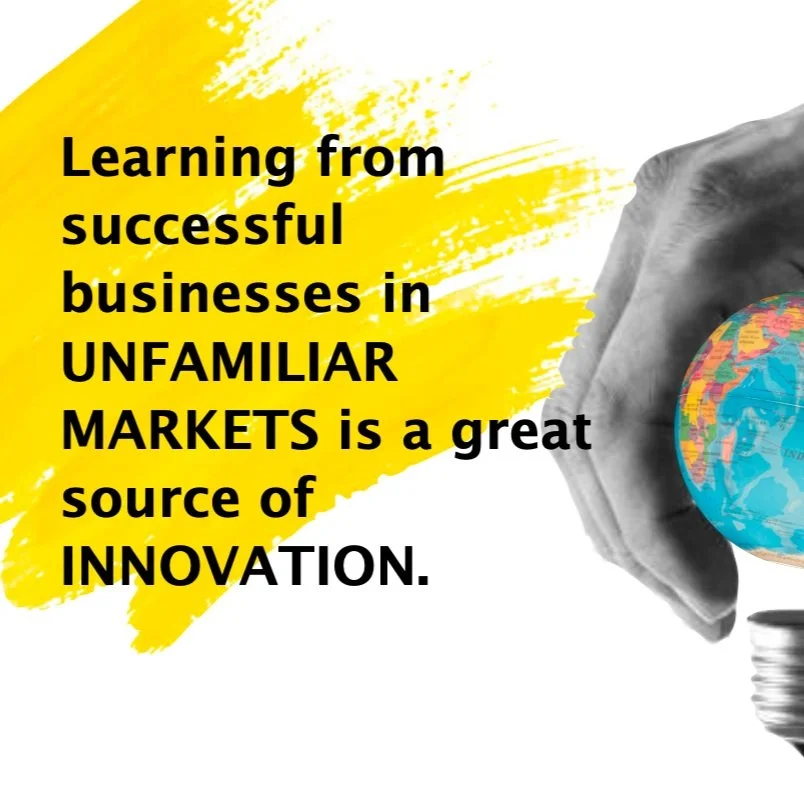2025 was a quieter year on the surface, but one of the most decisive. A reflection on choosing depth over scale, cultural judgement in global decision-making and why context matters even more as AI becomes embedded in how decisions are made.
Read MoreCopying competitors might seem like a safe bet, but it can backfire. Features they offer may not align with what users actually want. Plus, it keeps you lagging behind. Instead, focus on understanding competitors deeply, then blend that insight with your own strategy for real market impact.
Read MoreDiscover how studying successful businesses from diverse markets, like Spotify learning from China's Ximalaya, can drive innovation and growth in your own business. By staying open to these insights, you can stay ahead in today's dynamic business environment.
Read MoreDiscover strategies for setting prices tailored to diverse global markets. Consider economic context, competition, local attitudes towards paying, and cultural influences to optimise sales and growth, and enhance your brand's success in international markets.
Read MoreIn Kenya, M-Pesa's success stemmed from addressing key needs: most households lacked bank access, mobile phone usage was high, and societal support was crucial. M-Pesa bridged these gaps, enabling easy payments and reducing corruption. With favourable regulations and Safaricom's dominance, it flourished. Its lesson? Understand a market's nuances for real success.
Read MoreMaximise your global market reach by offering preferred local payment options. Explore diverse Alternative Payment Methods (APMs) from PIX in Brazil to PayTM in India. Tailor payments to your audience, considering factors like student demographics and evolving trends. Beware of fees and empower user control to optimise revenue potential.
Read MoreSuper apps thrive in Asia due to unique factors like fragmented markets, high mobile usage, and cultural norms. However, the adoption of super apps has been limited in other markets due to competitive digital ecosystems, regulatory challenges, and differing user behaviours. Despite this, there is potential for expansion as the digital landscape evolves.
Read MoreSeveral factors contribute to the business growth success of a market. Offering relevant Alternative Payment Methods (APMs) to your local users or customers is one of them. Inflexible payment systems can hinder growth potential while implementing the right payment strategies can accelerate growth. Stay ahead of the curve by embracing the evolving payment landscape and tailoring your approach to meet the needs of your target market. Unfortunately, this aspect is often overlooked by companies.
Read MoreStarting your business with a global mindset offers numerous advantages. It enables the creation of adaptable tech solutions, ensuring products and services resonate across different markets. It fosters innovation from diverse perspectives and positions the business for sustainable growth. Neglecting cultural considerations early on can lead to challenges in international expansion later. Think globally from the start for smoother expansion and lasting success.
Read MoreA summary of Beyo Global 2022 - a year of helping companies such as Spotify, SEEK/JobStreet Asia and Storytel with their international growth, advising start-ups on their business model, value proposition, customer/client experience and overall growth strategies, and supporting management teams of various-sized companies on their international expansion or international strategies or both.
Read More“By walking through a city, you meet the people who live there, and engage with them and their culture, on their terms in their environment. It allows you a small window into how they live. How they think about and experience the world.” Apart from interviewing carefully selected target user groups, by walking through local streets, via walks in local streets, you could expand your view of how things actually work in the local context or why your local users behave and feel in certain ways. Only then, you can choose the ‘right’ strategy and proposition for your local users, offer a better product or service and grow your business for that market.
Read MoreThe mantra: What works in one market does not always work in other markets. This applies to all aspects of strategy.
Without knowing much about your audiences & their context in a market you're not familiar with, you've nothing concrete to base on when putting the party together. It'd just like firing as many arrows as you can in the dark not knowing where the target is, hoping that 1 or 2 might hit close to the target. How much do you think you’ve to spend to have at least one land in the centre of the target board? Something worth challenging and pondering on.
Read MoreAs you progressively learn more about your users in different markets and their context, you will want to adapt your business and products accordingly in a more refined and accurate way for global growth. If your products and back-ends are built based on a language-based framework, you will soon realise how challenging and restricted it is for you to do any tailoring for individual market needs. A good way to manage this is to have a core experience that is shared universally. Content, functionalities, look and feel, portfolios, propositions and so on can then be adapted based on regions or locale.
Read MoreOne persuasive approach might work for one culture but less so for others, and vice versa. The art of persuasion is not universal. Understanding the underlying elements of what is important to each culture and their context means you could choose the right ‘tools’ to influence and convince your customers, for example, about your services, or even promote change of behaviours for the better.
Read MoreRounding up 2020 - a year of helping companies such as Spotify, Fiverr, Zynga and start-ups to define their strategies and business propositions globally, coaching and mentoring, as well as curating content to share. Most importantly, the launch of Global Design Guides.
Read MoreDon't try to predict what the behaviours change would be for different countries and then try to figure out what you can do to keep up with those changes. Instead, focus on what won’t change or are unlikely to change.
Read MoreCultural insights snippet into Japan. We look into how the environment, context and history influence and motivate locals unique behaviours, attitudes and expectations.
Read MoreCultural insights snippet into Russia. We look into how the environment, context and history influence and motivate locals unique behaviours, attitudes and expectations.
Read More2019 was a great year for Beyō Global - 18 countries with 16 new stamps on my passport and in-depth interviews with 260 people (in 10 different languages).
Read MoreAdapting products/ services to global markets through Three Levels of Culturalisation by Beyō Global. How to apply insights to the product roadmap, marketing strategy and business proposition.
Read More




















